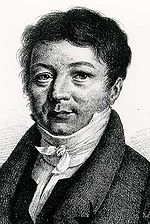- François Magendie
-
François Magendie 
François Magendie in 1822Born 6 October 1783 Died 7 October 1855 Nationality French Fields physiology Known for foramen of Magendie Influences Claude Bernard François Magendie (6 October 1783 – 7 October 1855) was a French physiologist, considered a pioneer of experimental physiology. He is known for describing the foramen of Magendie. There is also a Magendie sign, a downward and inward rotation of the eye due to a lesion in the cerebellum. Magendie was a faculty at the College of France, holding the Chair of Medicine from 1830 to 1855 (he was succeeded by Claude Bernard, who worked previously as his assistant).
His most important contribution to science was also his most disputed. Contemporaneous to Sir Charles Bell, Magendie conducted a number of experiments on the nervous system, in particular verifying the differentiation between sensory and motor nerves in the spinal cord, the so-called Bell-Magendie law. This led to an intense rivalry, with the British claiming that Bell published his discoveries first and that Magendie stole his experiments. The intensity of this scientific rivalry perhaps can only be compared to that between Isaac Newton and Robert Hooke.
Magendie was also a notorious vivisector, shocking even many of his contemporaries with the live dissections that he performed at public lectures in physiology. Richard Martin, an Irish MP, in introducing his famous bill banning animal cruelty in the United Kingdom, described Magendie's public dissection of a greyhound, in which the beast was nailed down ear and paw, half the nerves of its face dissected then left overnight for further dissection, calling Magendie a "disgrace to Society." There was a belief among British physicians, even those who defended animal experimentation, that Magendie purposely subjected his experimental animals to needless torture. A Quaker once visited him, questioning him about vivisection; according to Anne Fagot-Largeau's inaugural lesson at the College of France, he responded with much patience, argumenting the reasons of animal experimentation.[1] Besides drawing sharp criticism from contemporaries in both Britain and France, later scientists critical of Magendie's methods included Charles Darwin and Thomas Henry Huxley. He was also a major impetus to the antivivisection and vivisection reform movements, with Albert Leffingwell dedicating a chapter of his book An Ethical Problem to him.
In 1831, he was elected a foreign member of the Royal Swedish Academy of Sciences.
Works
- A Formulary for the Preparation and medical : administration of certain new Remedies / François Magendie. Transl. from the French of M. Magendie, with Annotations and additional Articles by James Manby Gully. - London : Churchill, 1835. Digitized edition
- Formulary for the preparation and mode of employing several new remedies. - London : Underwood, 1824. Digitized edition
Footnotes
- ^ Anne Fagot-Largeau's inaugural lesson at the College of France (French)
- Sourkes, Theodore L (March 2002). "Magendie and the chemists: the earliest chemical analyses of the cerebrospinal fluid". Journal of the history of the neurosciences 11 (1): 2–10. doi:10.1076/jhin.11.1.2.9109. PMID 12012572.
- Haas, L F (June 1994). "François Magendie (1783-1855)". J. Neurol. Neurosurg. Psychiatr. 57 (6): 692. doi:10.1136/jnnp.57.6.692. PMC 1072971. PMID 8006648. http://www.pubmedcentral.nih.gov/articlerender.fcgi?tool=pmcentrez&artid=1072971.
- Saavedra-Delgado, A M (. 1991). "François Magendie on anaphylaxis (1839)". Allergy proceedings : the official journal of regional and state allergy societies 12 (5): 355–6. PMID 1959774.
- Bloch, H (October 1989). "Francois Magendie, Claude Bernard, and the interrelation of science, history, and philosophy". South. Med. J. 82 (10): 1259–61. PMID 2678501.
- Shampo, M A; Kyle R A (May. 1987). "François Magendie: early French physiologist". Mayo Clin. Proc. 62 (5): 412. PMID 3553755.
- Rice, G (April 1987). "The Bell-Magendie-Walker controversy". Medical history 31 (2): 190–200. PMC 1139711. PMID 3550329. http://www.pubmedcentral.nih.gov/articlerender.fcgi?tool=pmcentrez&artid=1139711.
- Lazorthes, G; Campan L (. 1984). "[François Magendie (1783-1855)]". Bull. Acad. Natl. Med. 168 (1-2): 105–11. PMID 6383530.
- Breathnach, C S (November 1983). "Biographical sketches No. 34--Magendie". Irish medical journal 76 (11): 471. PMID 6358120.
- Gallistel, C R (April 1981). "Bell, Magendie, and the proposals to restrict the use of animals in neurobehavioral research". The American psychologist 36 (4): 357–60. doi:10.1037/0003-066X.36.4.357. PMID 7023302.
- Albury, W R (. 1977). "Experiment and explanation in the physiology of Bichat and Magendie". Studies in history of biology 1: 47–131. PMID 11609978.
- Gans, H (October 1972). "An early example of the use of surgical techniques in solving a physiologic problem (Francois Magendie)". Surgery, gynecology & obstetrics 135 (4): 616–22. PMID 4562124.
- Schiller, F (July 1971). "Magendie on medicine". California medicine 115 (1): 98. PMC 1517894. PMID 4327773. http://www.pubmedcentral.nih.gov/articlerender.fcgi?tool=pmcentrez&artid=1517894.
- Poynter, F N (April 1968). "Doctors in The Human Comedy (Guillaume Dupuytren, Jean Baptiste Bouillaud, François Joseph Victor Broussais, François Magendie)". JAMA 204 (1): 7–10. doi:10.1001/jama.204.1.7. PMID 4867960.
- KARLIK, L N (February 1959). "[Francois Magendie; 175th anniversary of his birth (1783-1855).]". Klinicheskaia meditsina 37 (2): 142–7. PMID 13642635.
- FENTON, P F (January 1951). "Francois Magendie (October 6, 1783-October 7, 1855)". J. Nutr. 43 (1): 3–15. PMID 14851024.
References
- Biography from the French Ministry of Culture
- Leffingwell, Albert. An Ethical Problem.
- Gray's Psychology
- Short biography and bibliography in the Virtual Laboratory of the Max Planck Institute for the History of Science
Categories:- 1783 births
- 1855 deaths
- Collège de France faculty
- French physiologists
- Members of the French Academy of Sciences
- Members of the Royal Swedish Academy of Sciences
Wikimedia Foundation. 2010.
